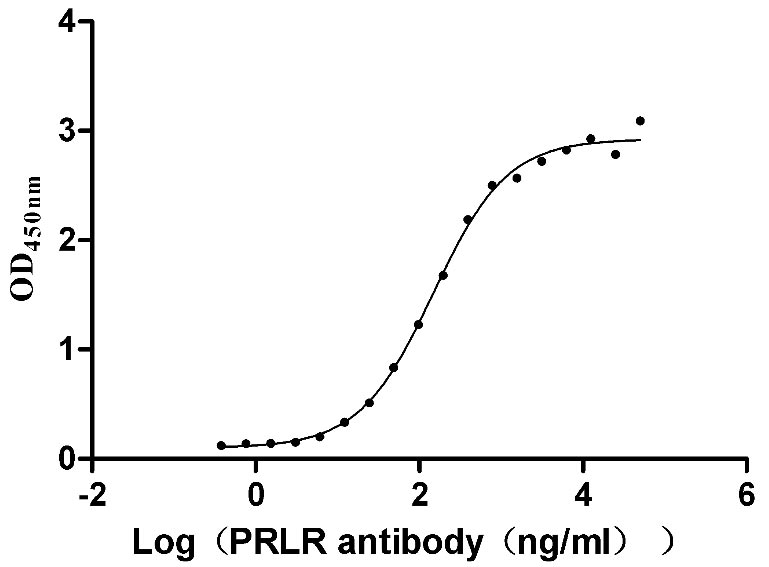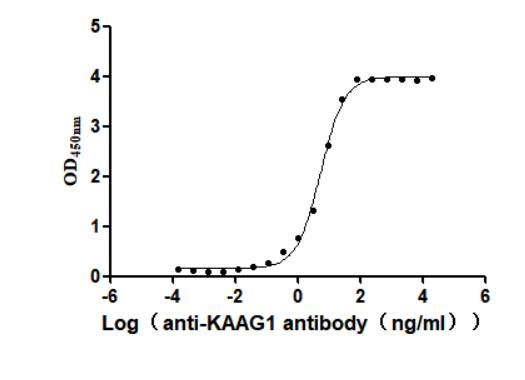Recombinant Human Proto-oncogene FRAT1 (FRAT1)
-
中文名称:人FRAT1重组蛋白
-
货号:CSB-YP849793HU
-
规格:
-
来源:Yeast
-
其他:
-
中文名称:人FRAT1重组蛋白
-
货号:CSB-EP849793HU
-
规格:
-
来源:E.coli
-
其他:
-
中文名称:人FRAT1重组蛋白
-
货号:CSB-EP849793HU-B
-
规格:
-
来源:E.coli
-
共轭:Avi-tag Biotinylated
E. coli biotin ligase (BirA) is highly specific in covalently attaching biotin to the 15 amino acid AviTag peptide. This recombinant protein was biotinylated in vivo by AviTag-BirA technology, which method is BriA catalyzes amide linkage between the biotin and the specific lysine of the AviTag.
-
其他:
-
中文名称:人FRAT1重组蛋白
-
货号:CSB-BP849793HU
-
规格:
-
来源:Baculovirus
-
其他:
-
中文名称:人FRAT1重组蛋白
-
货号:CSB-MP849793HU
-
规格:
-
来源:Mammalian cell
-
其他:
产品详情
-
纯度:>85% (SDS-PAGE)
-
基因名:
-
Uniprot No.:
-
别名:FRAT1Proto-oncogene FRAT1; Frequently rearranged in advanced T-cell lymphomas 1; FRAT-1
-
种属:Homo sapiens (Human)
-
蛋白长度:full length protein
-
表达区域:1-279
-
氨基酸序列MPCRREEEEE AGEEAEGEEE EEDSFLLLQQ SVALGSSGEV DRLVAQIGET LQLDAAQHSP ASPCGPPGAP LRAPGPLAAA VPADKARSPA VPLLLPPALA ETVGPAPPGV LRCALGDRGR VRGRAAPYCV AELATGPSAL SPLPPQADLD GPPGAGKQGI PQPLSGPCRR GWLRGAAASR RLQQRRGSQP ETRTGDDDPH RLLQQLVLSG NLIKEAVRRL HSRRLQLRAK LPQRPLLGPL SAPVHEPPSP RSPRAACSDP GASGRAQLRT GDGVLVPGS
-
蛋白标签:Tag type will be determined during the manufacturing process.
The tag type will be determined during production process. If you have specified tag type, please tell us and we will develop the specified tag preferentially. -
产品提供形式:Lyophilized powder
Note: We will preferentially ship the format that we have in stock, however, if you have any special requirement for the format, please remark your requirement when placing the order, we will prepare according to your demand. -
复溶:We recommend that this vial be briefly centrifuged prior to opening to bring the contents to the bottom. Please reconstitute protein in deionized sterile water to a concentration of 0.1-1.0 mg/mL.We recommend to add 5-50% of glycerol (final concentration) and aliquot for long-term storage at -20℃/-80℃. Our default final concentration of glycerol is 50%. Customers could use it as reference.
-
储存条件:Store at -20°C/-80°C upon receipt, aliquoting is necessary for mutiple use. Avoid repeated freeze-thaw cycles.
-
保质期:The shelf life is related to many factors, storage state, buffer ingredients, storage temperature and the stability of the protein itself.
Generally, the shelf life of liquid form is 6 months at -20°C/-80°C. The shelf life of lyophilized form is 12 months at -20°C/-80°C. -
货期:Delivery time may differ from different purchasing way or location, please kindly consult your local distributors for specific delivery time.Note: All of our proteins are default shipped with normal blue ice packs, if you request to ship with dry ice, please communicate with us in advance and extra fees will be charged.
-
注意事项:Repeated freezing and thawing is not recommended. Store working aliquots at 4°C for up to one week.
-
Datasheet :Please contact us to get it.
靶点详情
-
功能:Positively regulates the Wnt signaling pathway by stabilizing beta-catenin through the association with GSK-3. May play a role in tumor progression and collaborate with PIM1 and MYC in lymphomagenesis.
-
基因功能参考文献:
- The results of the present study suggest that nuclear FRAT1 activates the Wnt/beta-catenin signaling pathway and confers an increase in prostate cancer cell growth. PMID: 27599661
- These data suggest a potential role for targeting FRAT1 in the prevention of hypoxia-induced HCC cancer progression and metastasis mediated by epithelial-to-mesenchymal transition PMID: 27666874
- FRAT1 and ABCG2 overexpression is associated with carcinogenesis, progression, and poor prognosis in patients with Pancreatic ductal adenocarcinoma. PMID: 26178481
- Positive ROR2 and FRAT1 expression is associated with the progression and poor prognosis of chondrosarcoma. PMID: 25387569
- FRAT1 overexpression correlates with pathologic grade, proliferation, invasion and angiogenesis in brain gliomas. PMID: 25922553
- The mechanism of inhibiting beta-catenin phosphorylation involves the NDRG1-mediated upregulation of the GSK3beta-binding protein FRAT1. PMID: 24829151
- These results highlight the potential role of FRAT1 in tumorigenesis and progression of glioblastoma. PMID: 23613813
- The overexpression of Frat1 and beta-catenin was correlated with tumor differentiation, TNM stage, lymph node metastasis, and poor prognosis of NSCLC. PMID: 22528942
- Down-regulation of Frat1 expression reduced invasive ability in A549 cell line, further supporting idea that Frat1 may play crucial role in carcinogenesis, tumor invasiveness and dissemination in human lung cancer. PMID: 21818639
- Elevated expression of FRAT1 was associated with astrocytomas. PMID: 20041315
- Our results suggest that FRAT1 may be an important factor in the tumorigenesis and progression of gliomas, and could be used as a potential molecular marker for pathological diagnosis and a target for biological therapy. PMID: 20096670
- CKI epsilon-dependent phosphorylation of Dvl enhances the formation of a complex of Dvl-1 with Frat-1 and this complex leads to the activation of Wnt-3a-induced accumulation of beta-catenin PMID: 12556519
- findings support that Wnt/beta-catenin signalling may be aberrantly activated through FRAT1 overexpression in ovarian serous adenocarcinomas PMID: 16479254
- PKA phosphorylates FRAT1 in vitro as well as in intact cells and may play a role in regulating the inhibitory activity of FRAT1 toward GSK-3. PMID: 16982607
- Aberrant activation of beta-catenin/TCF pathway in esophageal cancer appears to be due to upstream events such as FRAT1 overexpression, and c-Myc may be an important element in oncogenesis of human ESCC induced by FRAT1. PMID: 18498136
显示更多
收起更多
-
亚细胞定位:Cytoplasm.
-
蛋白家族:GSK-3-binding protein family
-
数据库链接:
HGNC: 3944
OMIM: 602503
KEGG: hsa:10023
STRING: 9606.ENSP00000360060
UniGene: Hs.126057
Most popular with customers
-
Recombinant Human Prolactin receptor (PRLR), partial (Active)
Express system: Mammalian cell
Species: Homo sapiens (Human)
-
Recombinant Human Kidney-associated antigen 1(KAAG1) (Active)
Express system: Baculovirus
Species: Homo sapiens (Human)














